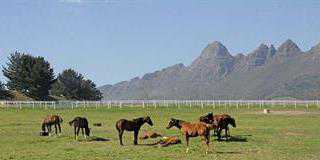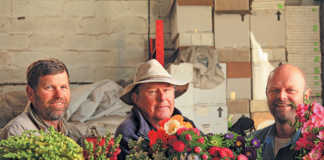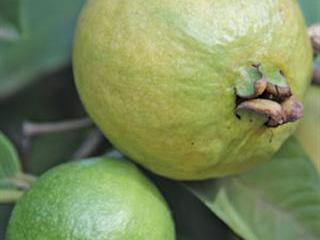
The upside of living through a crisis is usually that you emerge stronger, wiser and better prepared for future calamities. Like most sectors, the local guava industry wasn’t spared the effects of the recession, but instead of giving up, farmers decided to fight back – and their efforts seem to be paying off.
The guava industry hasn’t been the most dynamic fruit category, with production in the Western Cape (South Africa’s main guava-producing area) having remained steady at around 25 000t/ year for a while now. Last year was an exception. Adverse weather conditions resulted in a total harvest of less than 20 000t. But all indications are that things will return to normal this season.
According to Poena Malherbe, guava farmer and vice-chairperson of the Guava Producers Association (GPA), each year about 20 000t of guavas are used for processing, while the formal and informal fresh fruit market absorbs the other 5 000t.
Of the 20 000t that goes for processing, 8 000t to 10 000t are turned into guava pulp, much of which is exported, says Poena.
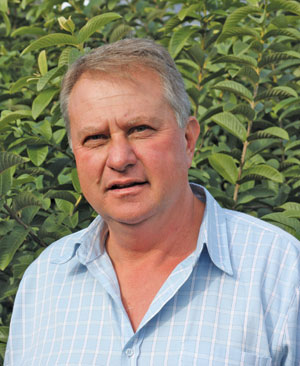
Poena Malherbe
During the recession, however, exports of guava pulp declined, as did the consumption of fresh guavas, with consumers opting for cheaper fruit. “Suddenly we had an oversupply of guavas in the local market and we realised that something needed to be done to stimulate consumption.” Luck was on the GPA’s side, because at the time (2009), the Department of Trade and Industry offered to help fund a generic marketing campaign for guavas, and contributed 80% of the capital needed.
The GPA contributed the other 20%, and Lethu Marketing was appointed to run the campaign. This ambitious campaign focuses on promoting using guavas in cooking and also the consumption of fresh guavas. It highlights the versatility of this fruit, which can be used in both sweet and savoury dishes, as well as the health benefits of guavas.
Creating a new market
Prompted by material sent out by Lethu Marketing, many local lifestyle, cooking and woman’s magazines ran articles about the health properties of guavas, pointing out, for example, that fresh guavas have three to six times more vitamin C than oranges. There were also recipes showing how to use guavas in cooking.
“The export market for guava pulp has now recovered, but as a result of the marketing campaign we have experienced a growth in the demand for fresh guavas in supermarkets,” says Poena. The steady increase in demand for packaged, fresh guavas in the formal market is very good news for farmers, he adds. This is because they can earn a much higher return for fruit sold fresh to supermarkets than for fruit sent to processing factories.
The market for fresh guavas has not necessarily grown in total – as noted, it’s been absorbing between 5 000t to 6 000t for a number of years. What has changed, explains Poena, is that fruit is now being sold at higher prices in the formal market, rather than in the informal fresh fruit market. “We are finally seeing some value adding happening for fresh guavas, because the supermarkets want high quality fresh guavas that are packaged in smaller, more appealing units. “The product has to draw attention on the supermarket shelves.”
The producer price for fresh guavas sold to supermarkets can be up to five times more than the price farmers get for guavas sold to processors. “The price for canning guavas is around R1,55/ kg, while the price for juice is about R1,10/ kg. But the producer price for fresh guavas ranges between R5/kg to R7/ kg.”
Like Poena, the members of the GPA hope that the campaign will help to increase the demand for fresh guavas even more – but the opportunity this will create also brings its own set of challenges. “Supermarkets and consumers demand bigger, better quality guavas,” he explains. “So if you want to produce fruit for the fresh market you have to align your production practices with the demands of the market.”
Production practices
However, Poena explains that there’s no great secret to producing bigger, better quality fruit. It’s simply a matter of taking more care when implementing the production management practices most farmers already follow. And special care must also be taken when picking fruit. “If you’re picking fruit for the supermarket you have to pick guavas at the right time.”
His advice is to pick more often – and in smaller quantities – and to pick fruit that’s still a bit green in colour so that it will have a longer shelf life. The way in which the fruit is handled during picking and packaging is also important. “You have to handle the fruit with care to prevent any surface damage.”
Mixed fruit farm
Poena has a diversified fruit farm in Klein Drakenstein, Paarl, where he produces guavas (5ha), peaches (6ha), nectarines (6ha), lemons (5ha) and wine grapes (20ha). He harvests between 200t and 250t of guavas a year. Like most guava farmers in the area, he grows the Fan Retief cultivar, known for producing high yields of up to 50t/ha. “We aim to market about 15% of the harvest as fresh fruit, 70% for canning and the remainder of the crop goes for juicing,” he says.
Guavas are harvested from late April to late September. The trees (or shallow-rooted shrubs), are evergreen and have to be pruned after harvesting, or in spring. “The trees must be pruned for controlled growth and maximum production of accessible fruit. To encourage the production of bigger fruit, shoots have to be pruned back further. This will result in fewer, but larger fruit,” explains Poena.
Fertilisation
He follows a fertilisation programme that helps in the production of larger, firmer, more succulent fruit. After pruning in November, the trees require a thorough nitrogen application. “We use 100kg of KaN (Koch Advanced Nitrogen) per hectare as well as 10m³ of chicken manure (either in liquid form or pelleted) per hectare. “In January and February we apply an NPK 1:0:1 mix consisting of 50% potash and 50% nitrogen at a rate of roughly 75kg/ha.”
This is followed by an NPK 3:0:5 mixture, which is also applied at 75kg/ha. “Guavas need a lot of potassium during harvesting, and when harvesting starts we apply potassium nitrate at a rate of 75kg/ha to encourage larger fruit size and firmer fruit.” The potassium nitrate fertiliser application is repeated on a monthly basis, three times during the harvest season.
Challenges
Farmers in the area are lucky, says Poena, because there are very few pests and diseases that pose a threat to guavas produced there. However, some farmers have become aware of the growing threat posed by fruit fly infestation. To keep fruit flies under control they do regular ground baiting in the guava orchards.
But, he explains, guava farming is not without its challenges. “Our highest production cost is labour. It can cost between R300 to R400 to pick 1t of guavas.” Therefore, the greatest challenges remain increasing yields, managing input costs and producing high quality fruit by carefully implementing better production management practices.
Guava recipe book
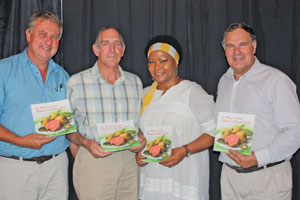
Seen above are (from left) Poena Malherbe, GPA vice-chairperson; guava farmer Dos Joubert from the farm Klein Drakenstein in Paarl; Thuli Mkhonza (Lethu Marketing); and GPA CEO Wiehan Victor.
As part of its marketing campaign the Guava Producers Association and Lethu Marketing launched 40 Ways to Enjoy Nature’s Wonder Fruit at Bien Donné Agri Cape Week 2012. As the title suggests, the book contains 40 recipes for guavas. These range from tips on preserving your own guavas or making guava chutney to guava salads, meat dishes with guava and, of course, some scrumptious guava desserts. For more information on the recipe book contact Leslie Nel on 021 447 9125, or at [email protected]
Contact Poena Malherbe at [email protected]
Contact the Guava Producers’ Association on 021 872 1501 or visit www.guavaproducers.co.za











